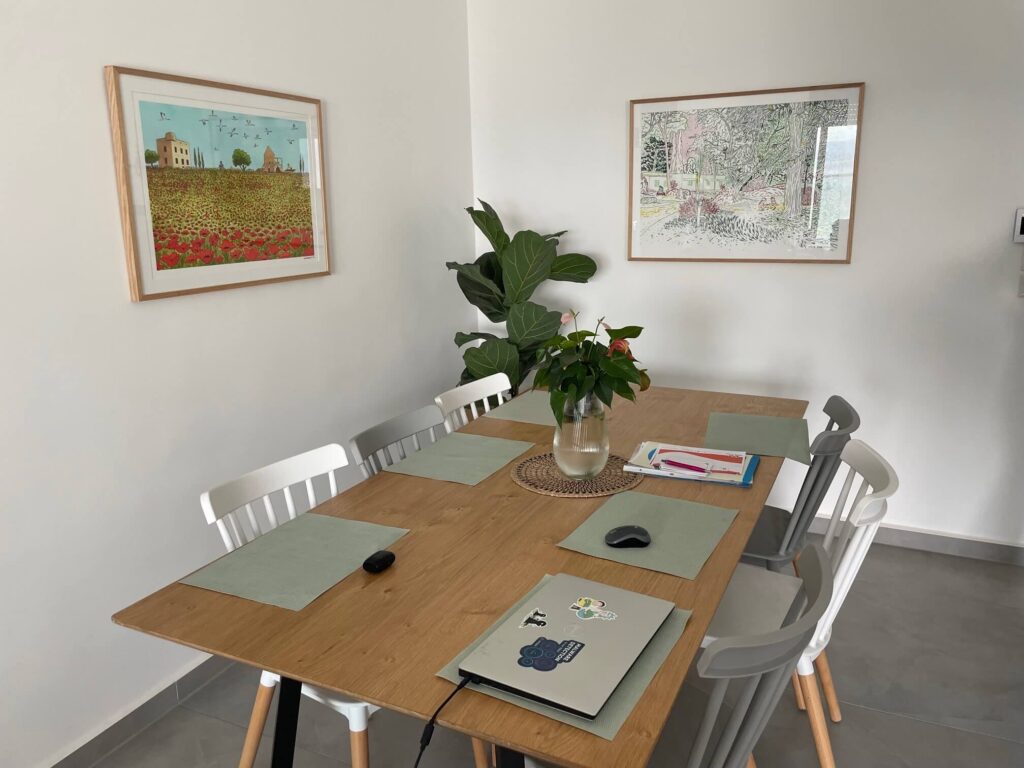
Healing from Trauma: Temp Housing “Now Feels Like a Home”
By: Nativia Samuelsen, ICEJ AID Administrator
During a recent visit to Kiryat Gat, where displaced residents of Nir Oz—a kibbutz that lost a quarter of its 400 residents who were either killed or kidnapped on October 7, 2023—are being temporarily housed, the ICEJ AID team met two survivors, Miri and Gidi, still healing from trauma.
Steps toward Healing from Trauma
After moving into their new home, Miri enrolled in a special trauma therapy program for 52 surviving families from this kibbutz still healing from unimaginable trauma with the financial support of the International Christian Embassy Jerusalem (ICEJ). The unique initiative combines practical support with trauma care to help October 7 massacre survivors move forward with hope.
Miri works as a massage therapist, while Gidi manages the agricultural division of the kibbutz. Tragically, on that dark day, the entire staff in the agricultural division was killed, and only Gidi and one other coworker survived.
“Gidi’s extensive experience in agriculture meant that he was needed on the kibbutz,” said his wife, Miri. “He is always at the kibbutz, but without the community there, he feels lost. It weighs heavily on him. He didn’t have the strength to think about this, to make purchases. He had to work.”
Miri described how her husband could not stop to grieve. He had to continue for the well-being of the crops and the business. Nevertheless, going back to the offices and seeing things as they once were—though the entire staff had been murdered—was greatly challenging and has left Gidi feeling depressed and without much energy or interest in other things. It is particularly painful to visit the covered patio with its table and chairs around, where all the agricultural team would sit as a “parliament” to discuss, eat lunch, or have a coffee.
On October 7, Gidi and Miri were in America visiting family. As the events unfolded, they were receiving horrible messages from their friends and relatives and were out of direct contact with their children for 33 terrifying hours. The experience is traumatizing for them to this day.
“We came here (to Kiryat Gat) with nothing,” Miri explained. “What wasn’t robbed was destroyed or broken. It isn’t possible to touch or save anything. The Gazans who came in even took our shoes and left theirs behind.”
Soon, these families will have to say goodbye to whatever remains of their former homes. Plans are in place for the government to clear out the houses once the families have had the chance to see if anything is salvageable, and they will level everything else and rebuild from the ground up.


New Homes and Healing
After hearing about the support program, Miri finally decided, despite Gidi’s lack of interest, to participate and receive some help to start their journey toward healing from the trauma experienced that dark day. It still took her several months to collect the energy to try it, time interspersed with bitter news regarding the hostages and attending memorials.
“The designer gave advice and was very helpful,” she recounted. “She didn’t intervene but gave me direction. It took some time to purchase the items.”
Miri purchased beautiful furniture and even bought Gidi a recliner chair he had always dreamed of. Others come to visit and are encouraged, and now her daughter, who at first disliked the cold, temporary apartment they moved to, wants to come and stay with her parents again.
“Even when we are not home, she will come to stay here because it now feels like a home,” Miri assured, adding that her husband also now appreciates the help and interim home.
“In our visits with just a few of these displaced Nir Oz families, we were so touched to see them finding a way forward because of the generosity of our Christian friends,” said Nicole Yoder, ICEJ VP of AID & Aliyah. “For people like … Miri and Gidi, who survived immense trauma, the project has offered both practical help and a chance to heal emotionally. Our hope was to let these distraught families know that they are not forgotten or alone. And, listening to their stories, it seems that the message came through loud and clear.”
The program’s focus is not just on replacing what was lost but creating homes that feel like their own again. Through color, personal touches, and thoughtful design, each home reflects the unique fingerprint of its residents. We are privileged to stand alongside these precious families to help them in their process of healing from trauma and are inspired by their resilience and courage.
You can support this project and others like it being sponsored by the Christian Embassy and help Israeli families recover and rebuild from the war sparked by the October 7 massacres.
Please give today to our Israel in Crisis fund at help.icejusa.org/crisis
Related Articles
ICEJ USA Branch Donates Ambulance to Magen David Adom by Marelinke van der Riet
Haifa Home Team Caring for Holocaust Survivors during War by Marelinke van der Riet
ICEJ War Relief Aid in Israel: One Year Overview by ICEJ Staff
Keep Learning
What Is Antisemitism? Unpacking History’s Longest Hatred By Susan Michael, ICEJ USA President


